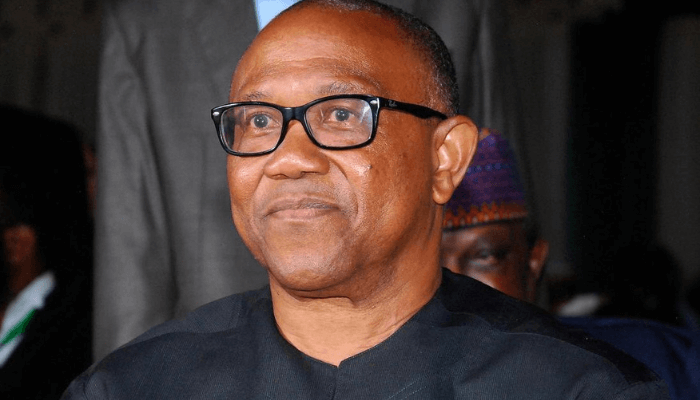Sen. Hope Uzodimma (left); Chief Justice of Nigeria (CJN), Justice M. Tanko and Hon. Emeka Ihedioha
By Henry O. Ukadike
I have been living in the United States of America for the past 30 years and have seen democracy in practice. The three branches of democracy – Executive, Legislature and Judiciary are independent and democratic institutions are in place to support them. Several judgments given by the US judiciary in recent times under the Trump administration have stopped the US President in his tracks in implementing major policy decisions. The beauty of the process is that even Trump as President cannot influence any court’s decision, then to talk of the American Supreme Court.
The judiciary in the US is also democratised starting from the selection of the judges, which involves voting, to the dispensation of justice, which involves the jury – a set of ordinary individuals selected randomly to hear a case and reach a conclusion on the matter. The determination of complex cases by a jury means that you don’t have to be a law expert or a highly sophisticated person to know what is right or wrong.
According to Lord Hewart CJ in the case of R v Sussex Justices, ex parte McCarthy (1924), he made the all-time famous quote “Not only must Justice be done, it must also be seen to be done”. The implication of this statement is that you don’t need to x-ray a judgment to be convinced that it is a fair judgment or a just decision. A fair and sound judgment should be identified as such by all and sundry, as what is right is right and what is wrong is wrong.
The above brings us to one of the most controversial decisions of the Supreme Court of Nigeria in its judgment of January 14, 2020 in the case of Senator Hope Uzodimma v Rt. Hon Emeka Ihedioha, former governor of Imo State. In that judgment, the larger population of the society both in Nigeria and abroad are in agreement that the Judgment was not a fair one. The declaration of Senator Hope Uzodimma who came 4th in the election results declared by INEC as the winner of the election was most bizarre and ran contrary to any known logic, legal or otherwise. The decision led to several protests of a magnitude never seen before all over the country and by Nigerians in diaspora in many foreign countries including the United States, Britain, South Africa, France to mention but a few.
Some of the unbelievable outcomes of that judgment include:
- The Supreme Court and not INEC allocated votes to a candidate in an election
- The total votes allocated to the candidates are more than INEC accredited voters
- 366 polling unit results were presented by the prosecution witness and Supreme Court awarded another fictitious 22 polling units to make it 388 to Senator Hope Uzodimma
- The result of the 388 polling units were for only two political parties, APC and PDP contrary to all the other over 2100 polling units that had several party results
- Some of the polling unit results of Uzodimma are more than the registered voters in the polling unit.
- Strangely a single policeman’s evidence was relied upon to deliver the judgment
- INEC who owns the documents for collecting results discredited the result sheets
Not minding all these glaring anomalies, the Nigeria Supreme Court went ahead to declare Senator Hope Uzodimma winner of an election in which he came 4th. That judgment greatly damaged the integrity of not just the Supreme Court but also that of their Lordships who superintended the case. All efforts to get them to review the case was to no avail as they stuck to their guns to avoid opening themselves up to deluge of review requests and further public opprobrium.
The damage suffered by the Supreme Court in that judgment cannot be better captured than by the dissenting review judgment of Justice Centus Nweze who accepted that the Supreme Court erred in awarding the controversial victory to Senator Hope Uzodimma. He described the judgment as “a wonder that shall never end” and further said “There were over 129,340 votes in excess of accredited voters. The court can redeem its image by setting aside its judgment. If not, this will continue to hurt our electoral jurisprudence. It is awkward and embarrassing to the court”. I need not go further to express the damage the Supreme Court inflicted on itself in this matter after this strong statement by one of her own.
The opportunity to heal this damage has once again come the way of the Supreme Court in the form of two cases recently initiated in the judicial system. One is a case filed at the Federal High Court Abuja by one Kingdom Okere, a lawyer and the gubernatorial candidate of the Reform and Advancement Party (RAP) in Imo State in the 2019 general elections and another one filed by Philip Umeadi SAN at the Supreme Court on behalf of Uche Nwosu and the Peoples Democratic Party (PDP) for interpretation of a case decided on 20th December 2019 in which the Supreme Court decided that Uche Nwosu was the nominated candidate of the All Progressives Congress APC and Action Alliance AA, based on which his candidature in the election was disqualified for double nomination.
In the last three weeks, the press both mainstream and social media has been awash with different analyses of the expected outcome of the cases. While the Kingdom Okere/RAP matter has been adjourned twice and slated for further hearing on September 29th, the Philip Umeadi matter at the Supreme Court has no hearing date yet. With these two cases in the judicial system, the Supreme Court is once more heading into another major controversy, as many legal pundits and majority of the people have declared that the end of the Hope Uzodimma governorship has come.
Majority of those who have analyzed these cases both in Nigeria and here in the United States are of the opinion that having disqualified Uche Nwosu on the grounds of double nomination, it presupposes that the Supreme Court recognised him as the candidate of the APC and also that of the AA. If he wasn’t the candidate of the APC before the law, he wouldn’t have been disqualified. It is also important here to note that the primaries of the APC were conducted first before that of AA and Uche Nwosu’s name was sent to INEC as APC candidate after winning the primaries.
It was only when they started having disagreements in APC about the nomination two days later that he went to AA. So, he was the nominee of APC before becoming that of AA and INEC received his APC nomination two clear days before his other nomination came from AA. This therefore presupposes that APC could not have legally had another candidate while Uche Nwosu’s candidature subsists and if they did, it will also amount to disqualification of both candidates as the APC did not officially explore any window for candidate substitution. This is a straightforward matter and does not require any technicalities or complicated explanation.
The great matter arising from here now is, who is Senator Hope Uzodimma in the 2019 Imo State gubernatorial election? Which party did he represent? He couldn’t have been a candidate of a party (APC) that had already nominated a candidate (Uche Nwosu). Was Senator Uzodimma an independent candidate? Is there any provision in the Constitution or the Electoral Act for Independent Candidature?
These are some of the critical questions that the Supreme Court need to take into consideration in the Philip Umeadi matter. Some have argued that the Supreme Court will sweep the matter under the carpet by hiding under the protection of declaring the case a pre-election matter, but many legal analysts are asking whether an unknown person to the law will benefit in an election he is not part of because the matter was not brought up on time, can you place something on top of nothing? Moreover, the Supreme Court judgment disqualifying Uche Nwosu came later in December 2019.
In all these, one can see that there is a highly controversial matter before the Supreme Court. The simple reasoning that can flow from the December 20th judgment of the Supreme Court is that Senator Hope Uzodimma could not have been a candidate in that election and by disqualifying Uche Nwosu as candidate of both APC and AA, all the votes that were scored by both political parties (APC and AA) remain null and void. This is what obtained after the Supreme Court Judgments in Zamfara and Bayelsa where the disqualification of the candidates led to the voiding of their votes and that of their political parties, thereby giving victory to the next highest votes scorer.
If one takes into consideration the glaring facts that the Supreme Court overlooked while giving the January 14 victory to Senator Hope Uzodimma in that most bizarre judgment, those who are celebrating that this time Hope Uzodimma has been nailed should be circumspect in their celebration as this matter is going to be handled by the same Supreme Court. While it is a golden opportunity for the court to right its wrongs, do damage control and make the ordinary man see that Justice has been done, it is also possible that this Supreme Court of wonder may rely on technicalities once again to continue on its path of infamy and dash the hopes of millions of Imo citizens by retaining a man that was not a candidate in an election as the winner. One thing nobody can question is the finality of the judgment of the Supreme Court.
The critical question deserving an answer by the Supreme Court of Nigeria is “how much damage is it willing to inflict on its reputation because of one man – Senator Hope Uzodimma.”
Dr. Henry O. Ukadike, writes from San Bernardino, California in the USA.
Please note that the opinion expressed by the writer in this article does not reflect the position of the publishers of www.newsbitsng.com





